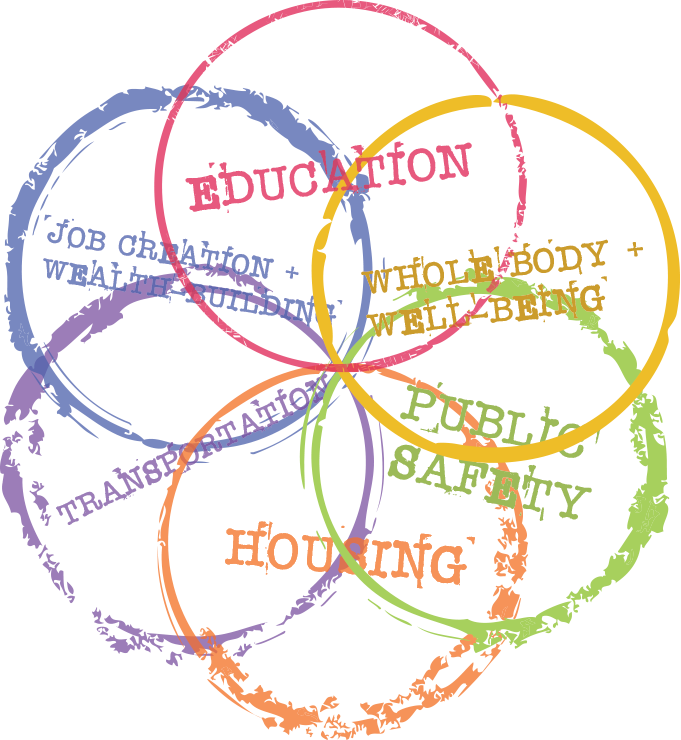Community Justice Requires Career Development
Featured Op-Ed in the Richmond Times-Dispatch
By Brittany Bush, Adrienne Cole Johnson, Rebecca Keel, and Jackie Washington
If community justice offers a commitment to equity, economic viability, and supportive respect, then job-creation and career-development as a means of wealth-building are tangible tools to mold this vision.
We include career-development because it is equally as important as jobs and workforce-training. “Career” suggests a living-wage position that provides growth for individuals and their families.
So while finding a job is a start, we must also pay attention to what career-development looks like for various communities.
It’s important that we agree to a baseline definition and understanding of wealth or wealth-building. The definition and understanding of wealth can vary between individuals, communities, and even zip codes.
For some, wealth means owning a home or land to leave behind for family. It may also mean having a solid retirement plan, stocks, and other investments.
For others, wealth is oftentimes an intangible word because of the lack of financial means or resources to join in the conversation. Even saving is hard because, after regular bills and responsibilities, there just isn’t any money to put away. This gap in access and capacity is why it’s necessary that community justice be included in conversations and plans about job-creation and wealth-building.
As job-creation and career-development are recognized as key elements of sustainability, we must ensure representation of all residents at the wealth-building table when addressing concerns of access and opportunity.
***
When we have sustainable jobs or careers, we are able to take care of ourselves, our children, and our families. This behavior and ability is observed by our children and creates a level of confidence and competence that cannot be bought. The sense of responsibility, value, worth, and identity goes beyond a job and, in turn, sustainability is created.
Historically, our American society can be viewed as having been built on a caste system that we often pretend doesn’t exist. The never-ending trend has been to marginalize massive communities of color while the wealth and power gap increases. With mind, body, and spirit left broken from years and years of hard labor, it is difficult to climb out.
There isn’t an election year or politician that passes by without “jobs” being mentioned, yet few employment opportunities exist in lower-income communities — and almost no white-collar jobs make their way to those communities.
People are less likely to challenge the status quo when, for generations, they’ve been made to feel lucky to have their job, their home, and food to eat. The system continues to be as strong as it was during the days preceding the Civil War — and communities and people are still kept from jobs for a number of reasons.
We cannot consider a society just when it allows the most vulnerable communities to suffer, which is why there needs to be a push to bring more jobs into these neighborhoods where they can add not only to economic growth in the community, but to the overall quality of life.
Job-creation and career-development should be a priority for communities in the margin, moving residents from crisis to thriving. When residents have well-paying jobs and or careers, they are able to re-imagine life from survival mode into plans for safe and affordable housing, emergency savings, and eventually wealth-building.
***
What we do know is that Richmond has been there before — in a society where communities are invested in and where people are provided the knowledge and opportunities to create their own wealth realities. Think Jackson Ward circa 1910. Banks and department stores were owned and operated by marginalized people, namely black individuals and families. Yet Jackson Ward still stood as a community that was thriving and flourishing, providing a variety of services to a wide range of people.
The passage of the Federal-Aid Highway Act resulted in the economic digression of Jackson Ward’s thriving culture and economy. This federal, state, and local divestment then paved the way for further, discriminatory practices, such as red-lining.
Currently, Richmond is at a critical juncture. As the area grows and expands, several organizations and business are interested in the landscape of job-training as well as workforce- and/or career-development.
Universities are attempting to leverage resources and the city has established the Office of Community Wealth Building, which is designated to lead a community-wide vision and plan for systematic change in Richmond. There is much work to do — but more importantly, it is happening. Through the lens of community justice, we will continue to use a collective voice through this process of necessary change.
***
Let us all continue the conversation and ensure the creation of seats at the table for our neighbors across racial and socioeconomic differences. We invite you to join with a community of citizens concerned about job-creation and wealth-building in Richmond for a film, discussion, and solution-oriented planning. Join us at the Robinson Theatre (2903 Q Street, Richmond 23223) on Saturday, Feb. 17 from 11 a.m. to 3 p.m. The gathering is free, family-friendly, and part of an ongoing effort to bring Richmonders together in support of more equitable personal and economic advancement for all.
Brittany Bush is member of the Together We Will RVA (TWWRVA) steering committee, where she works with the diversity team to further its mission of uplifting voices and issues of marginalized communities and peoples.
Adrienne Cole Johnson, MSW, is a social justice professional focused on creative approaches to change who has worked in the areas of engagement, education, entrepreneurship, and politics for the past 20 years.
Rebecca Keel, MSW, is a community organizer who focuses on intersectional social justice and creative approaches to dealing with current and historical conflict.
Jackie Washington, MSW, is a community convenor and supporter of grassroots organizing efforts for Richmond’s marginalized yet resilient communities.
